 EROSION PRINCETON SERIES OF CONTEMPORARY POETS FOR OTHER BOOKS IN THE SERIES, SEE PAGE 84 EROSION BY JORIE GRAHAM PRINCETON UNIVERSITY PRESS PRINCETON, NEW JERSEY Copyright 1983 by Princeton University Press Published by Princeton University Press, Princeton, New Jersey In the United Kingdom: Princeton University Press, Chichester, West Sussex All Rights Reserved Library of Congress Cataloging in Publication DataGraham, Jorie, 1951-Erosion.(Princeton series of contemporary poets)I. Title. II. Series.PS3557.R214E7 1983 811.54 82-61365ISBN 0-691-06570-5 ISBN 0-691-01405-1 (pbk.) Publication of this book has been aided by a grant from The Whitney Darrow Publication Reserve Fund of Princeton University Press This book has been composed in Linotron Sabon Princeton University Press books are printed on acid-free paper and meet the guidelines for permanence and durability of the Committee on Production Guidelines for Book Longevity of the Council on Library Resources Printed in the United States of America Designed by Laury A. Egan 10 9 CONTENTS FOR JIM ACKNOWLEDGMENTS Grateful acknowledgment is made to the editors of the following journals in which these poems first appeared: ANTAEUS San Sepolcro The Daffodil Massacios Expulsion Scirocco THE AMERICAN POETRY REVIEW Wanting a Child Erosion The Age of Reason Reading Plato In What Manner the Body is United with the Soule Wood Wasps in the Spanish Willow At Luca Signorellis Resurrection of the Body Patience At the Long Island Jewish Geriatric Home Two Paintings by Gustav Klimt The Sense of an Ending THE IOWA REVIEW I Watched a Snake Mist To a Friend Going Blind THE NATION The Lady and the Unicorn and Other Tapestries PLOUGHSHARES Kimono NEW ENGLAND REVIEW My Garden, My Daylight (reprinted in the Pushcart Anthology, 1982) On Form for Berryman (Jan 7, 1982) At the Exhumed Body of Santa Chiara, Assisi MISSOURI REVIEW For John Keats Salmon IRONWOOD Making a Living Love History Mother of Vinegar THE REAPER Tragedy PEQUOD Still Life with Window and Fish Of Unevenness I would also like to thank the Ingram-Merrill Foundation and the Bunting Institute at Radcliffe College for Fellowships that aided me in the completion of this book. EROSION SAN SEPOLCRO In this blue light I can take you there, snow having made me a world of bone seen through to.
EROSION PRINCETON SERIES OF CONTEMPORARY POETS FOR OTHER BOOKS IN THE SERIES, SEE PAGE 84 EROSION BY JORIE GRAHAM PRINCETON UNIVERSITY PRESS PRINCETON, NEW JERSEY Copyright 1983 by Princeton University Press Published by Princeton University Press, Princeton, New Jersey In the United Kingdom: Princeton University Press, Chichester, West Sussex All Rights Reserved Library of Congress Cataloging in Publication DataGraham, Jorie, 1951-Erosion.(Princeton series of contemporary poets)I. Title. II. Series.PS3557.R214E7 1983 811.54 82-61365ISBN 0-691-06570-5 ISBN 0-691-01405-1 (pbk.) Publication of this book has been aided by a grant from The Whitney Darrow Publication Reserve Fund of Princeton University Press This book has been composed in Linotron Sabon Princeton University Press books are printed on acid-free paper and meet the guidelines for permanence and durability of the Committee on Production Guidelines for Book Longevity of the Council on Library Resources Printed in the United States of America Designed by Laury A. Egan 10 9 CONTENTS FOR JIM ACKNOWLEDGMENTS Grateful acknowledgment is made to the editors of the following journals in which these poems first appeared: ANTAEUS San Sepolcro The Daffodil Massacios Expulsion Scirocco THE AMERICAN POETRY REVIEW Wanting a Child Erosion The Age of Reason Reading Plato In What Manner the Body is United with the Soule Wood Wasps in the Spanish Willow At Luca Signorellis Resurrection of the Body Patience At the Long Island Jewish Geriatric Home Two Paintings by Gustav Klimt The Sense of an Ending THE IOWA REVIEW I Watched a Snake Mist To a Friend Going Blind THE NATION The Lady and the Unicorn and Other Tapestries PLOUGHSHARES Kimono NEW ENGLAND REVIEW My Garden, My Daylight (reprinted in the Pushcart Anthology, 1982) On Form for Berryman (Jan 7, 1982) At the Exhumed Body of Santa Chiara, Assisi MISSOURI REVIEW For John Keats Salmon IRONWOOD Making a Living Love History Mother of Vinegar THE REAPER Tragedy PEQUOD Still Life with Window and Fish Of Unevenness I would also like to thank the Ingram-Merrill Foundation and the Bunting Institute at Radcliffe College for Fellowships that aided me in the completion of this book. EROSION SAN SEPOLCRO In this blue light I can take you there, snow having made me a world of bone seen through to.
This is my house, my section of Etruscan wall, my neighbors lemontrees, and, just below the lower church, the airplane factory. A rooster crows all day from mist outside the walls. Theres milk on the air, ice on the oily lemonskins. How clean the mind is, holy grave. It is this girl by Piero della Francesca, unbuttoning her blue dress, her mantle of weather, to go into labor. Come, we can go in.
It is before the birth of god. No-one has risen yet to the museums, to the assembly linebodies and wingsto the open air market. This is what the living do: go in. Its a long way. And the dress keeps opening from eternity to privacy, quickening. Inside, at the heart, is tragedy, the present moment forever stillborn, but going in, each breath is a button coming undone, something terribly nimble-fingered finding all of the stops.
MIST This quick intelligence that only knows distracted, blind, poking like a nose, forever trying to finger the distinctions: the rosethat opens in the rose,that opens inthe mist, its geography much quicker than its history. I live in it, it lives in me, whore to, heir to, I am the one it does unto. And this is its shoreline: the edge of the continent, of the whole idea, the ragged rocks becoming foam, where the sky drops this low each day to fish for us. It should burn off, they say, yet see it eat the bony rocks, its fog-flesh making everything part of itself until I am the fish that ate the fish that ate the littlest, in thought, in afterthought; swimming the one world deaf, waving, goodbye for motor, fish that cant hear itself swim, its hum in the water; swimming this other as the rose inside the rose that keeps on opening; and then this other still wherein it is a perfect rose because I snap it from the sky, because I want it, another, thicker, kind of sight. READING PLATO This is the story of a beautiful lie, what slips through my fingers, your fingers. Its winter, its far in the lifespan of man.
Bareheaded, in a soiled shirt, speechless, my friend is making lures, his hobby. Flies so small he works with tweezers and a magnifying glass. They must be so believable theyre truefeelers, antennae, quick and frantic as something drowning. His heart beats wildly in his hands. It is blinding and who will forgive him in his tiny garden? He makes them out of hair, deer hair, because its hollow and floats. Past death, past sight, this is his good idea, what drives the silly days together.
Better than memory. Better than love. Then they are done, a hook under each pair of wings, and its Spring, and the men wade out into the riverbed at dawn. Above, the stars still connect-up their hungry animals. Soon theyll be satisfied and go. Meanwhile upriver, downriver, imagine, quick in the air, in flesh, in a blue swarm of flies, our knowledge of the graceful deer skips easily across the surface.
Dismembered, remembered, its finally alive. Imagine the body they were all once a part of, these men along the lush green banks trying to slip in and pass for the natural world. SCIROCCO In Rome, at 26 Piazza di Spagna, at the foot of a long flight of stairs, are rooms let to Keats in 1820, where he died. Now you can visit them, the tiny terrace, the bedroom. The scraps of paper on which he wrote lines are kept behind glass, some yellowing, some xeroxed or mimeographed. Outside his window you can hear the scirocco working the invisible.
Every dry leaf of ivy is fingered, refingered. Who is the nervous spirit of this world that must go over and over what it already knows, what is it so hot and dry thats looking through us, by us, for its answer? In the arbor on the terrace the stark hellenic forms of grapes have appeared. Theyll soften till weak enough to enter our world, translating helplessly from the beautiful to the true. Whatever the spirit, the thickening grapes are part of its looking, and the slow hands that made this mask of Keats in his other life, and the old woman, the memorials custodian, sitting on the porch beneath the arbor sorting chick-peas from pebbles into her cast-iron pot. See what her hands know they are its breath, its mother tongue, dividing, discarding. There is light playing over the leaves, over her face, making her abstract, making her quick and strange.
But she has no care for what speckles her, changing her, she is at her work. Oh how we want to be taken and changed, want to be mended by what we enter. Is it thus with the world? Does it wish us to mend it, light and dark, green and flesh? Will it be free then? I think the world is a desperate element. It would have us calm it, receive it. Therefore this is what I must ask you to imagine: wind; the moment when the wind drops; and grapes, which are nothing, which break in your hands. IN WHAT MANNER THE BODY IS UNITED WITH THE SOULE Finally I heard into music, that is, heard past the surface tension which is pleasure, which holds the self afloat, miraculous waterstrider with no other home.
Not that I heard very deep, but heard there was a depth, a space through which you could fall, an echo travel, and meaning small, jeweled, deep-water flash. I heard in a piano concerto the distance between the single instrument and the whole republic, heard the argument each made for fate, free will. And listened to the piano, solo, on its gold hook, the tip of the baton, struggle and struggle. From the mud of the Arno in winter, 1967, we pulled up manuscripts illuminated by monks in tenth century monasteries. Sometimes the gold letters loosened into the mud, into our hands. We found elaborate gold frames, Annunciations, candlesticks.
Next page
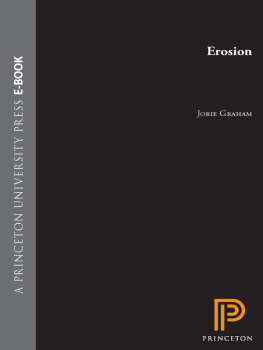
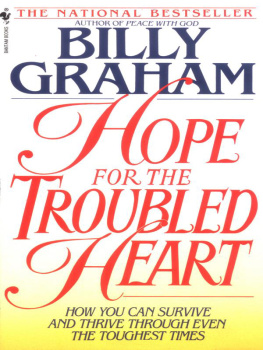

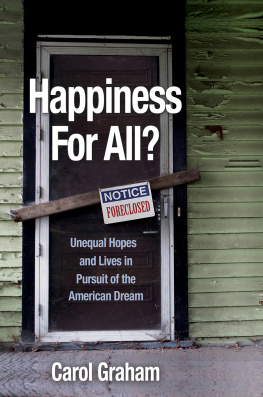


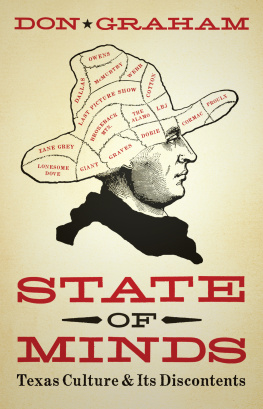
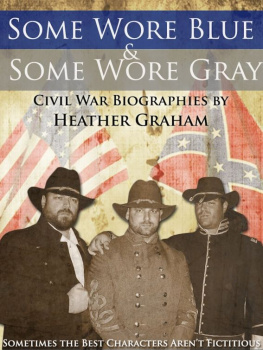






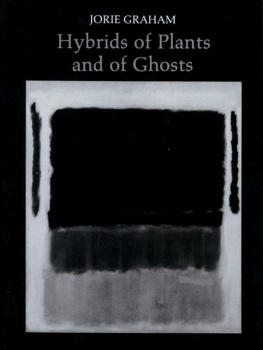
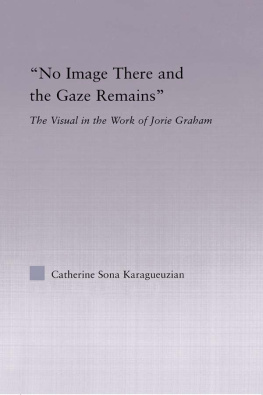
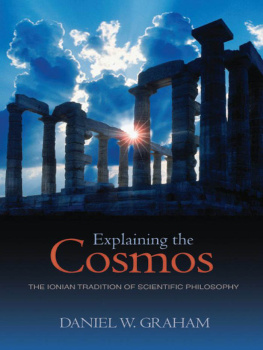
 EROSION PRINCETON SERIES OF CONTEMPORARY POETS FOR OTHER BOOKS IN THE SERIES, SEE PAGE 84 EROSION BY JORIE GRAHAM PRINCETON UNIVERSITY PRESS PRINCETON, NEW JERSEY Copyright 1983 by Princeton University Press Published by Princeton University Press, Princeton, New Jersey In the United Kingdom: Princeton University Press, Chichester, West Sussex All Rights Reserved Library of Congress Cataloging in Publication DataGraham, Jorie, 1951-Erosion.(Princeton series of contemporary poets)I. Title. II. Series.PS3557.R214E7 1983 811.54 82-61365ISBN 0-691-06570-5 ISBN 0-691-01405-1 (pbk.) Publication of this book has been aided by a grant from The Whitney Darrow Publication Reserve Fund of Princeton University Press This book has been composed in Linotron Sabon Princeton University Press books are printed on acid-free paper and meet the guidelines for permanence and durability of the Committee on Production Guidelines for Book Longevity of the Council on Library Resources Printed in the United States of America Designed by Laury A. Egan 10 9 CONTENTS FOR JIM ACKNOWLEDGMENTS Grateful acknowledgment is made to the editors of the following journals in which these poems first appeared: ANTAEUS San Sepolcro The Daffodil Massacios Expulsion Scirocco THE AMERICAN POETRY REVIEW Wanting a Child Erosion The Age of Reason Reading Plato In What Manner the Body is United with the Soule Wood Wasps in the Spanish Willow At Luca Signorellis Resurrection of the Body Patience At the Long Island Jewish Geriatric Home Two Paintings by Gustav Klimt The Sense of an Ending THE IOWA REVIEW I Watched a Snake Mist To a Friend Going Blind THE NATION The Lady and the Unicorn and Other Tapestries PLOUGHSHARES Kimono NEW ENGLAND REVIEW My Garden, My Daylight (reprinted in the Pushcart Anthology, 1982) On Form for Berryman (Jan 7, 1982) At the Exhumed Body of Santa Chiara, Assisi MISSOURI REVIEW For John Keats Salmon IRONWOOD Making a Living Love History Mother of Vinegar THE REAPER Tragedy PEQUOD Still Life with Window and Fish Of Unevenness I would also like to thank the Ingram-Merrill Foundation and the Bunting Institute at Radcliffe College for Fellowships that aided me in the completion of this book. EROSION SAN SEPOLCRO In this blue light I can take you there, snow having made me a world of bone seen through to.
EROSION PRINCETON SERIES OF CONTEMPORARY POETS FOR OTHER BOOKS IN THE SERIES, SEE PAGE 84 EROSION BY JORIE GRAHAM PRINCETON UNIVERSITY PRESS PRINCETON, NEW JERSEY Copyright 1983 by Princeton University Press Published by Princeton University Press, Princeton, New Jersey In the United Kingdom: Princeton University Press, Chichester, West Sussex All Rights Reserved Library of Congress Cataloging in Publication DataGraham, Jorie, 1951-Erosion.(Princeton series of contemporary poets)I. Title. II. Series.PS3557.R214E7 1983 811.54 82-61365ISBN 0-691-06570-5 ISBN 0-691-01405-1 (pbk.) Publication of this book has been aided by a grant from The Whitney Darrow Publication Reserve Fund of Princeton University Press This book has been composed in Linotron Sabon Princeton University Press books are printed on acid-free paper and meet the guidelines for permanence and durability of the Committee on Production Guidelines for Book Longevity of the Council on Library Resources Printed in the United States of America Designed by Laury A. Egan 10 9 CONTENTS FOR JIM ACKNOWLEDGMENTS Grateful acknowledgment is made to the editors of the following journals in which these poems first appeared: ANTAEUS San Sepolcro The Daffodil Massacios Expulsion Scirocco THE AMERICAN POETRY REVIEW Wanting a Child Erosion The Age of Reason Reading Plato In What Manner the Body is United with the Soule Wood Wasps in the Spanish Willow At Luca Signorellis Resurrection of the Body Patience At the Long Island Jewish Geriatric Home Two Paintings by Gustav Klimt The Sense of an Ending THE IOWA REVIEW I Watched a Snake Mist To a Friend Going Blind THE NATION The Lady and the Unicorn and Other Tapestries PLOUGHSHARES Kimono NEW ENGLAND REVIEW My Garden, My Daylight (reprinted in the Pushcart Anthology, 1982) On Form for Berryman (Jan 7, 1982) At the Exhumed Body of Santa Chiara, Assisi MISSOURI REVIEW For John Keats Salmon IRONWOOD Making a Living Love History Mother of Vinegar THE REAPER Tragedy PEQUOD Still Life with Window and Fish Of Unevenness I would also like to thank the Ingram-Merrill Foundation and the Bunting Institute at Radcliffe College for Fellowships that aided me in the completion of this book. EROSION SAN SEPOLCRO In this blue light I can take you there, snow having made me a world of bone seen through to.